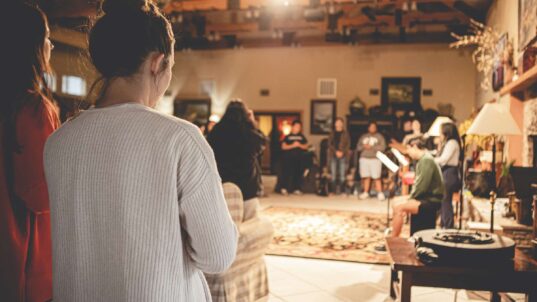Our founder, Jay Stern, thought that IF’s citizen staff work reports could be an aid to democratic discussion in the United States. But what, exactly, is a democratic discussion or, to put it differently, what makes a discussion ‘democratic’? I recently found an answer to this question while viewing Norman Rockwell’s ‘Freedom of Speech’ in an exhibit of Rockwell’s work called ‘Telling Stories’ at the National Portrait Gallery in Washington.
The paintings, sketches, and photographs in the ‘Telling Stories’ exhibit are taken from the private collections of George Lucas and Steven Spielberg, both of whom know something about telling stories, and both of whom seem to feel a deep appreciation for Rockwell. Rockwell was celebrated during his lifetime for his realistic images of American life. He has, more recently, been celebrated for his idealistic images of an American life that no longer exists. Lucas and Spielberg clearly feel nostalgia for it. But Rockwell has also been criticized for depicting an America and a kind of American life that never actually existed—or, if it did, existed only for a very few, very privileged, and very white Americans.
It will thus come as no great surprise that Rockwell’s ‘Freedom of Speech’ does not depict Shawn Eichman burning the American flag, or Abbie Hoffman wearing it as a shirt, or Larry Flynt wearing it as a diaper. It will be no surprise that it does not portray John Cleland writing Fanny Hill, or Andres Serrano dipping a crucifix in a bucket of urine, or Robert Maplethorpe … well, this is probably better left unsaid on our website. And no one will be surprised that it has nothing whatsoever to do with George Soros writing out checks to the Obama campaign, or the Koch brothers writing out checks to the tea-party, or multi-national corporations writing out checks to anyone and everyone who is running for office in Washington.
All of this—along with Terri Jones threatening to burn the Koran—is what Americans associate with freedom of speech these days. I am sometimes surprised that no one has used it as a defense for 9/11. But Rockwell’s portraits of ‘The Four Freedoms’ were inspired by one of FDR’s fireside chats, delivered during the 1940 Christmas blitz of London, nearly a year before Pearl Harbor, in which Roosevelt identified freedom of speech, freedom from want, freedom to worship, and freedom from fear as the essential cornerstones of American democracy. And his portrait of ‘Freedom of Speech’, in particular, was inspired by one of his neighbors, Jim Edgerton, who had the courage to stand up for views that everyone else disagreed with at a Vermont town meeting. What impressed Rockwell about this incident was not just that Edgerton had the courage to say what he really believed to be true despite its unpopularity. It was also, if not primarily, that Edgerton’s neighbors ‘let him have his say’—that ‘no one had shouted him down’. ‘There it is’, Rockwell said, ‘Freedom of Speech’.
I think that Rockwell was right about this. I also think that it is the kind of thing that Jay Stern had in mind when he talked about democratic discussion, and when he founded the Interactivity Foundation.
I say this, because much of the IF discussion process is focused upon creating conditions that will encourage our panelists to say what they really think, no matter how unpopular it might be, and upon creating conditions that will encourage their neighbors to let them have their say and not to shout them down.
I think that this or something very much like it is what democratic discussion is all about. I think that it consists almost entirely of the courage to say what we think is true and the tolerance, indeed the respect, to listen to what other people think is true. But I also think that it is easy to forget what democratic discussion is all about, and that it is easier still, even for people who regard themselves as defenders of democracy, to shout people down and to try to prevent them from having their say if and when they think that what they are saying is false, or wrong, or that it undermines their interests or what they believe to be in the public interest.
I know that Roosevelt and Rockwell may have only been telling stories. And I know that I may only be telling stories too. But I think that the idea that this kind of freedom of speech is one of the essential cornerstones of democracy is still a very good story to tell, and a much better story about freedom of speech and democratic discussion than many of the others that people tell about them today.


